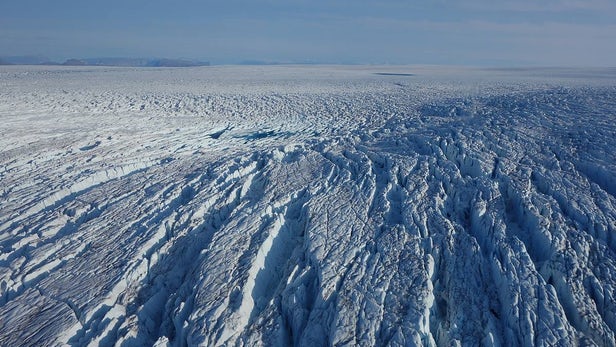Evidence of "tipping points" turning climate change from gradual to rapid

Ice core samples taken from a glacier in Greenland indicate that sudden temperature spikes occurred during the last Ice Age, and new research suggests that slowly-building CO2 is to blame (Credit: Coen Hofstede)
Anyone who has seen The Day After Tomorrow will be familiar with the concept of "tipping points" where slow and gradual changes in atmospheric CO2 levels can reach a point that triggers a sudden change in temperatures. While a lot of the aforementioned movie remains firmly in the realm of science fiction, a new study has found evidence of such tipping points occurring in the past, resulting in dramatic climate changes over a short period.
Ice core samples in Greenland have shown that during the last glacial period, temperatures periodically shot up by as much as 10° C (18° F) in a matter of decades, but it wasn't clear why that was the case. A study by researchers at the Alfred Wegener Institute and the University of Cardiff has shed some more light on this phenomena, known as Dansgaard-Oeschger events, using a computer model that simulates the relationship between the atmosphere, ocean currents and sea ice levels.
The team found that a high concentration of CO2 in the atmosphere was the likely suspect for these sudden warming events. The CO2 levels didn't have to rise quickly either: after a period of slow but constant growth, the climate can reach a crucial tipping point, setting off a chain reaction that results in temperature spikes.
As CO2 levels increase, the eastern part of the Pacific Ocean warms up faster than the western region of the Atlantic does, resulting in stronger trade winds across Central America. That means more moisture is carried out of the Atlantic, leaving the surface water saltier and denser, and speeding up the "conveyor belt" motion of the Atlantic Ocean. This strong current carries warmer waters north, and as a result leads to increased temperatures. Inversely, the slowing down of this current at other times has been linked to the beginning of ice ages.
"With this study, we've managed to show for the first time how gradual increases of CO2 triggered rapid warming," says Xu Zhang, first author of the study. "Our simulations indicate that even small changes in the CO2 concentration suffice to change the circulation pattern, which can end in sudden temperature increases."
While the findings fit the records in the past, the researchers don't want to declare that the same thing could happen in the future, because the Earth is a very different place nowadays.
"We can't say for certain whether rising CO2 levels will produce similar effects in the future, because the framework conditions today differ from those in a glacial period," says Gerrit Lohmann, co-author of the study. "That being said, we've now confirmed that there have definitely been abrupt climate changes in the Earth's past that were the result of continually rising CO2 concentrations."
The research was published in the journal Nature Geoscience.
Source: Alfred Wegener Institute
